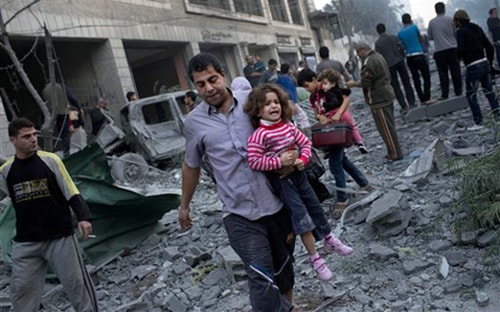War in Gaza: Easy to start, difficult to end
(Baonghean) - The war in the Gaza Strip is getting fiercer. In just the past two days, more than 200 Palestinians have been killed, bringing the total number of deaths in this conflict to nearly 600, most of whom are civilians. Israel continues to declare an expansion of its military campaign in Gaza. Meanwhile, both US Secretary of State John Kerry and UN Secretary General Ban Ki Moon have gone to Egypt to discuss with the host country's officials about promoting a ceasefire agreement. Can the Israel-Hamas conflict end soon through these diplomatic efforts?
 |
| The war has escalated seriously in the Gaza Strip, causing consequences for the people. Photo: AP |
With more than 100 people killed each day, the past two days have been the bloodiest since the Israel-Hamas conflict broke out two weeks ago. The war shows no signs of stopping, with Israeli Defense Minister Moshe Yaalon announcing that he will expand the military campaign against underground Hamas bases. The United Nations Security Council, although convening an emergency session to discuss the situation in the Gaza Strip, has only issued statements of deep concern and asked the parties to quickly move towards a ceasefire. Therefore, the international community expects the visit of UN Secretary General Ban Ki Moon and US Secretary of State John Kerry to Egypt to soon find a ceasefire solution for this conflict that is causing many civilian casualties. However, the question is whether the current conflict will soon end when neither Hamas nor Israel has shown any concessions, and the prospect of reconciliation between Israel and Hamas is still very far away.
One of the important keys to peace at this time is the stance of Hamas, which recently rejected Egypt's proposal for a ceasefire with Israel and is waiting for the governments in Qatar and Türkiye to come up with another proposal. The reason why Egypt's role as a mediator in the Israel-Hamas conflict is not as effective as it was in 2012 is because the current Egyptian government has changed. The Muslim Brotherhood of former Egyptian President Mohammad Morsi previously had close ties with the Palestinian militant group Hamas, so it will not be difficult for Egypt to "talk" to Hamas.
Meanwhile, the current government of President El Sisi of Egypt has listed the Muslim Brotherhood as a terrorist organization and has a poor relationship with Hamas, so of course, Hamas can hardly trust the prospect of Cairo standing up to protect their interests in negotiations. On the other hand, Egypt has not made any concessions or favors to Hamas as before, so the ceasefire proposal proposed by Cairo was rejected by Hamas. The current influence on Hamas' political leadership lies in Qatar, a country with a pro-American stance, so of course the key factor for a ceasefire cannot appear. Hamas is fighting to try to gain some advantage that can be bargained at the negotiating table despite the Gaza Strip currently having to brace itself against bombs and bullets from Israel.
On the US side, by listing Hamas as a terrorist organization, the US has no direct relationship with this organization so it has to work through intermediaries such as Egypt and Qatar. Therefore, analysts assess that this trip to the Middle East by the US Secretary of State is unlikely to bring about a significant breakthrough. Meanwhile, Israel seems to be showing its determination to "uproot" Hamas by expanding its military campaign in the air and on the ground in the Gaza Strip despite the possibility of being harshly condemned by the international community. Importantly, the US does not support Hamas.
So clearly, when the US and Egypt have not created a weighty voice with Hamas, the UN Security Council has not been able to have a strong voice with both Israel and Hamas, the current war in Gaza will continue to cause casualties to the people here. There are not many positive prospects, however, the simultaneous visit of UN Secretary General Ban Ki Moon and US Secretary of State John Kerry is still expected to bring a new catalyst to push Israel and Hamas to a ceasefire agreement. If this war cannot be stopped immediately, once again the innocent people in the Gaza Strip will suffer the consequences of the war.
Nguyen Cao Bien






